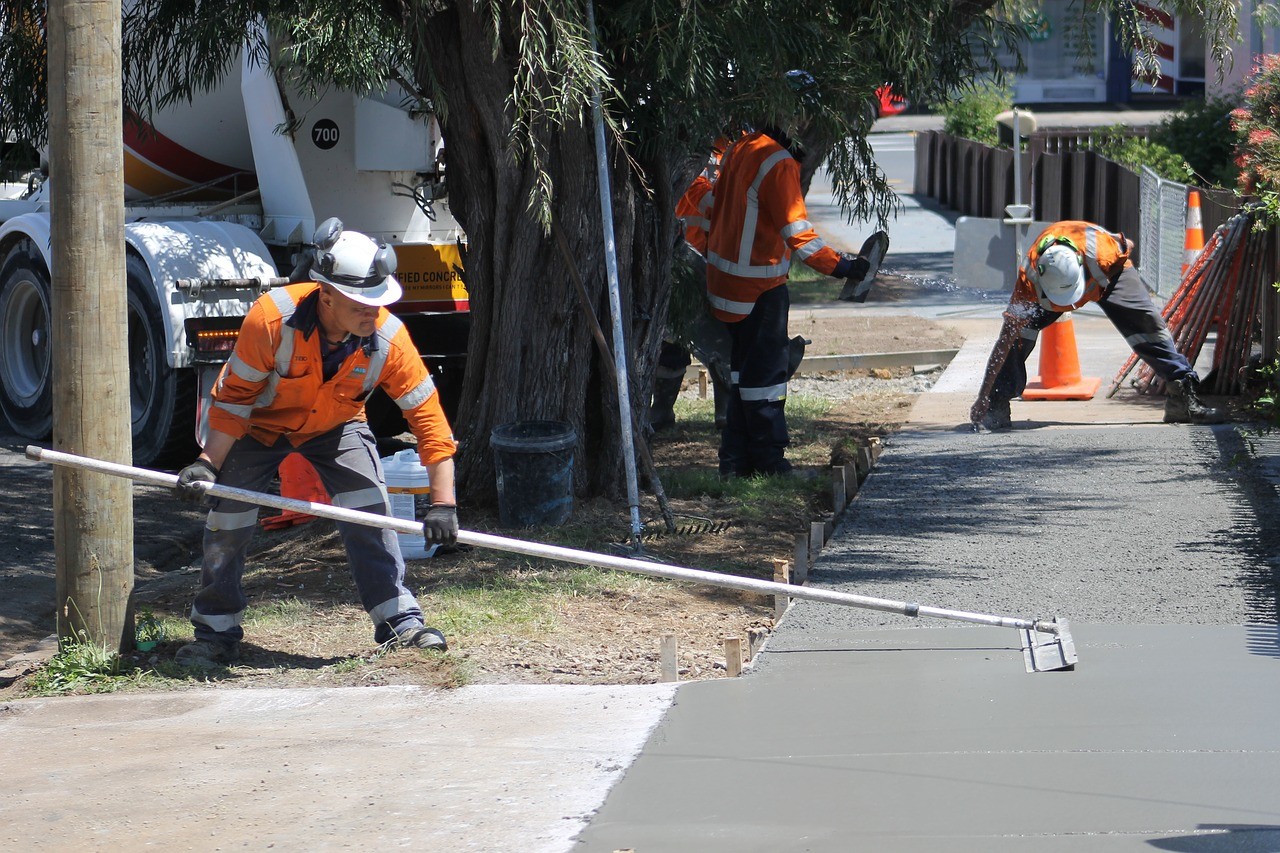Most people will have a good idea of what you mean when talking about general concrete paving - pour some concrete to fill an area or shape, smooth it out and let it dry. So many things around us in day-to-day life are made of concrete - stairs, parking blocks, highway dividers, curbs... just to name a few. But what is specifically meant when the term "concrete flatwork" is used? Exactly as it sounds, this is specifically when concrete is poured in a defined area and made flat - think of things like concrete patios, driveways, sidewalks, or parking lots.
Thanks in large part to its durability and long lifespan, concrete is one of the most popular options among paving materials, alongside asphalt. And just like asphalt, there's more than meets the eye when it comes to a quality concrete flatwork job - it's not as simple as pour, smooth and dry. An experienced concrete contractor will have a defined process with multiple steps that all go into making sure that the concrete is not only flat, but level (to prevent pooling or drainage issues), durable, and correctly sized both in height and area. Part of this involves using frames (typically wood) and a sublayer which works to help strengthen the final surface to protect from deterioration and damages such as cracking and splitting of the surface.
So now that you know what it means, let's dive into a couple other things that you may want to know when it comes to residential or commercial flatwork - namely cost and how to go about finding the right contractor for residential or commercial paving in Denver.
How Much Does Concrete Flatwork Cost?
Across the board, concrete costs more than other types of pavement including asphalt (read our comparison of asphalt vs. concrete). This is counteracted, however, by the fact that concrete is generally more durable, so the extra cost may ultimately pay off down the line. Whereas something like asphalt can last decades if maintained properly, concrete typically requires less repair/maintenance and will often outlast an asphalt surface.
The actual cost of any concrete paving job will depend on a handful of factors such as size of the area to be paved as well as the concrete company that you choose - some are simply more or less expensive, and it also can depend on the quality of concrete that they use for the job (not all concrete is the same).
Cost by Size of Paved Area
Generally speaking, concrete paving tends to cost about $4-$8 per square foot, though these are loose numbers that depend on a number of factors and can be outside that range in certain cases. That also may not include the cost of removing an existing deteriorated surface in the case of a remove-and-replace project.
Smaller surfaces that are more detail-intensive can run more expensive than a larger area - volume discounts are common among contractors and larger flat surfaces like parking lots or sidewalks also tend to involve less detail than something like a nice new back patio designed to fit into your overall landscape vision. You can use this resource to get a rough idea of what a slab of various sizes may cost.
Finding The Right Concrete Flatwork Contractor
If you decide to call in professionals for your concrete job, you'll likely have plenty of options. So how do you choose? Here are a few tips to help you sift through your options:
- Expertise - obviously, you'll want to make sure that the contractor you select has the necessary expertise in the exact type of job you need done. Look through their website and have a conversation with someone at the company to get a sense of whether they have experience in the type of flatwork involved in your project.
- Reviews - as with anything else, reading reviews of the company from their past customers is a great way to get a sense of what working with them will be like. You can often find reviews for concrete contractors in places like Google and Homeadvisor. You can read some of our reviews here.
- Go local - a local company will have the most expertise regarding the best way to do a particular job in your particular region - this includes understanding things like the local environment/weather and how it impacts pavement, local codes and zoning laws (if applicable), and licensing and insurance.
- Pricing - if you've narrowed it down to a couple options, it's never a bad idea to get a couple different bids. This also typically involves interacting with someone at the company, which itself can help provide a glimpse into what working with the company would be like. It's important to keep in mind here, however, that cheapest is not always best - you want the job done right the first time, and sometimes that means not going with the cheapest option if that means they're providing lower-quality service.
If you're ready to call in a professional contractor for concrete flatwork in Denver, we're the local experts you need, offering competitive pricing and unbeatable customer service on every job. Reach out to us today to discuss your flatwork project and get a free quote.
